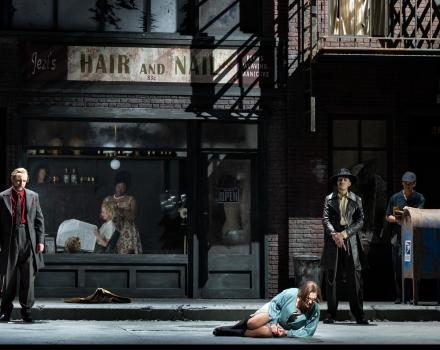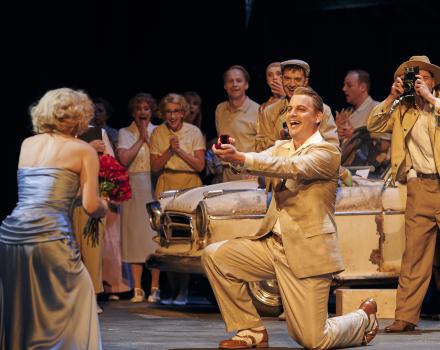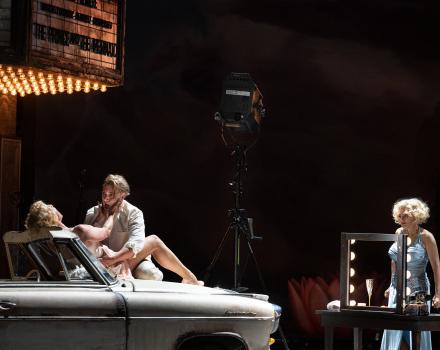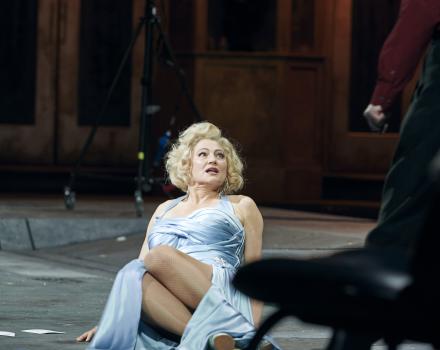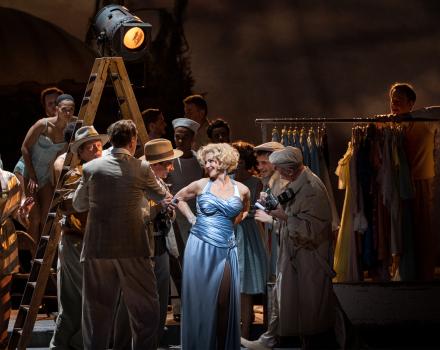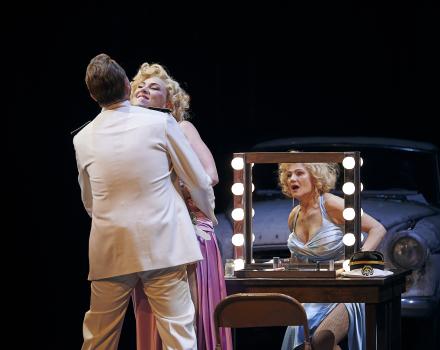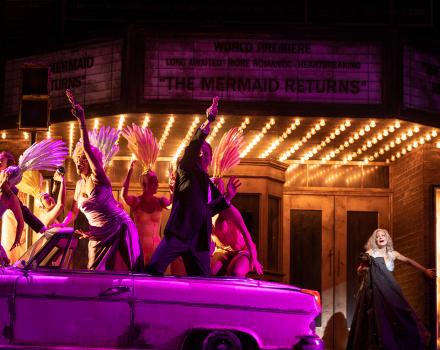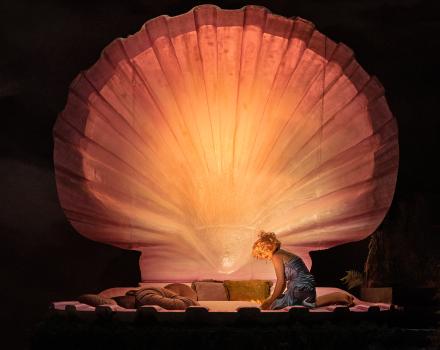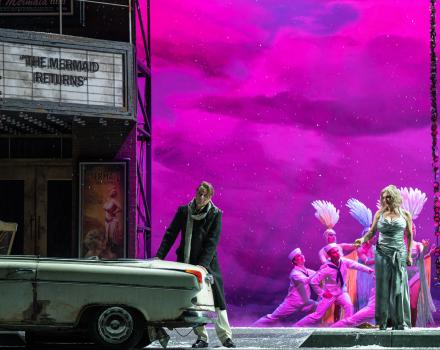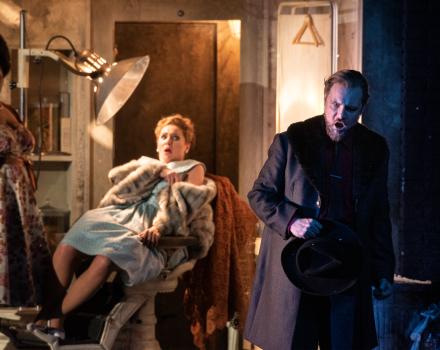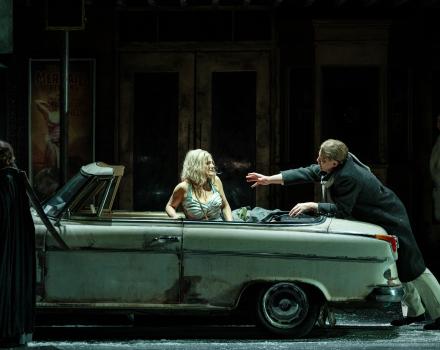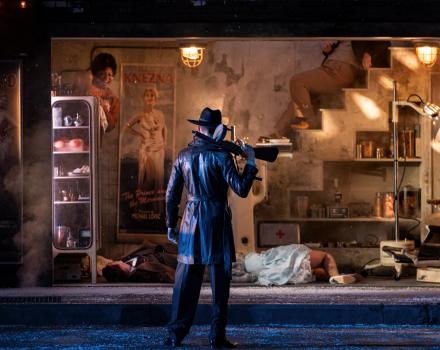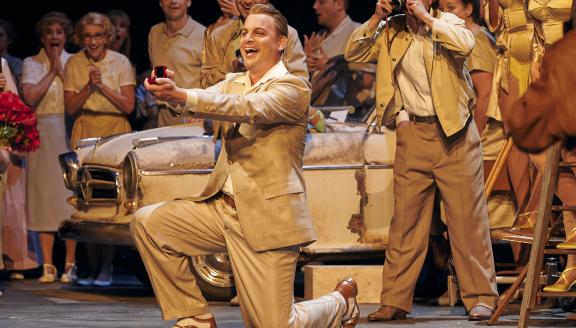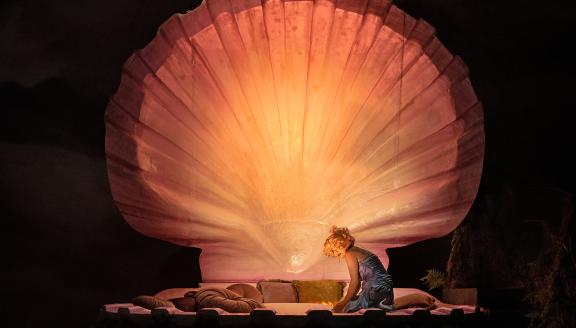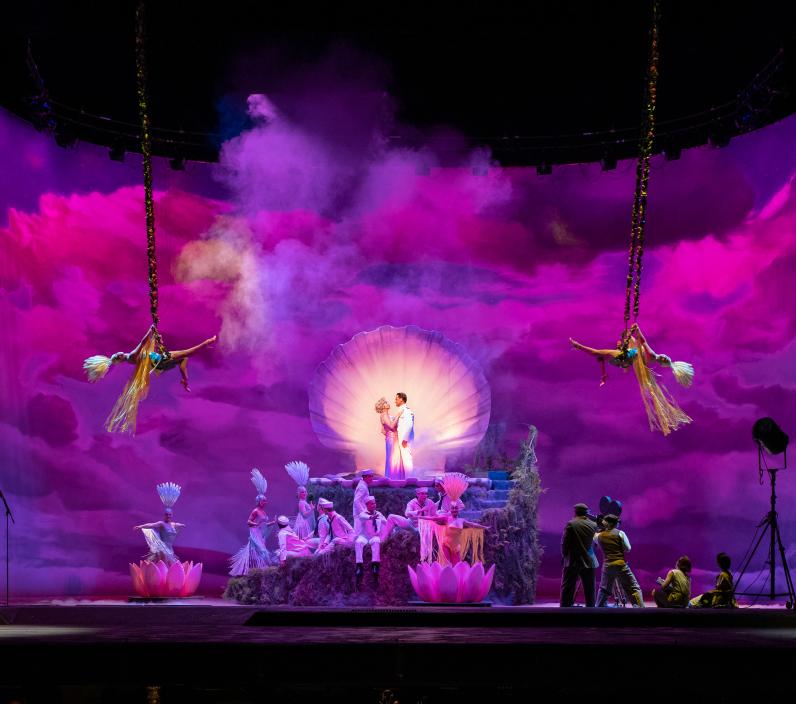
More than anything in the world, Rusalka, a mysterious and elusive water nymph, yearns to become human to win the heart of a young prince. But this metamorphosis comes at a price: she will lose her voice and be damned forever should their love story fail. To what lengths would you go to find happiness?
A lyrical fairy tale inspired by The Little Mermaid and nourished by Czech ballads, Rusalka is an opera of great depth. Already established for his symphonic music, Dvořák here reveals himself to be an opera composer of great lyrical intensity and beauty. Its highlight is often considered to be the wistful, haunting ‘Song to the Moon’, in which Rusalka asks the moon to reveal her love to the prince. For their new production for Dutch National Opera, directors Philipp Stölzl and Philipp M. Krenn present a young woman on the outskirts of society. At the cinema, she fantasises about living in the golden heyday of Hollywood, by the side of a handsome movie star. Conductor Joana Mallwitz leads the Royal Concertgebouw Orchestra, soprano Johanni van Oostrum sings the role of Rusalka. Czech tenor Pavel Černoch sings the role of the prince, and American mezzo-soprano Raehann Bryce-Davis makes her debut as the witch Ježibaba. A timeless tale of dreams, desire and disappointment.
CAST
|
Prince
|
Pavel Černoch
|
|---|---|
|
Foreign Princess
|
Annette Dasch
|
|
Rusalka
|
Johanni van Oostrum
|
|
Ježibaba
|
Raehann Bryce-Davis
|
|
Vodník Water Goblin
|
Maxim Kuzmin-Karavaev
|
|
Kitchen boy
|
Karin Strobos
|
|
Gamekeeper
|
Erik Slik
|
|
Hunter
|
Georgiy Derbas-Richter
|
|
Wood Nymphs
|
Inna Demenkova
Elenora Hu
Maya Gour
|
|
Orchestra
|
Royal Concertgebouw Orchestra
|
|
Chorus
|
Dutch National Opera Chorus
|
| ... | |
|
Music
|
Antonín Dvořák
|
|---|---|
|
Text
|
Jaroslav Kvapil
|
|
Conductor
|
Joana Mallwitz
|
|
Director
|
Philipp Stölzl
Philipp M. Krenn
|
|
Sets
|
Heike Vollmer
Philipp Stölzl
|
|
Costumes
|
Anke Winckler
|
|
Lighting
|
Philipp Stölzl
|
|
Choreography
|
Juanjo Arqués
|
|
Dramaturgy
|
Simon Berger
|
| ... | |
VIDEOS
Story
Act I
Rusalka is sad: she is in love with a prince who is not even aware of her existence. She would do anything to meet him and become part of his world. In desperation, Rusalka turns to the witch Ježibaba, whom she begs to transform her. Ježibaba agrees, but in return Rusalka will have to lose her voice. What’s more, if she fails to win the prince’s heart she will be doomed for eternity. Rusalka agrees to the terms, and the transformation takes place. When the prince sees her, he is immediately captivated by her.
Act II
In the prince’s world, preparations are being made for a large celebration. The prince’s passion for Rusalka soon evaporates: he is repulsed by the coldness of her body and her silence. When a human princess arrives, it doesn’t take long for the prince to fall for her instead. He only has eyes for her and rejects Rusalka. Distraught, Rusalka leaves.
Act III
Rusalka is back in her own world but she no longer feels at home there either. Ježibaba appears and urges her to kill the prince. Rusalka refuses to do so. Meanwhile, the prince has come to his senses and returns to Rusalka in despair. He is full of remorse and asks her for a kiss. Rusalka warns him that it could be fatal. The prince insists — and dies in her arms.
Insights
Five things to know about this Rusalka
1. The composer: Antonín Dvořák
Rusalka is Czech composer Antonín Dvořák’s most famous opera. And its most famous aria is the ‘Song to the Moon,’ in which Rusalka begs the moon to tell the prince of her love. The opera score is wonderfully poetic and sensual, creating musical effects that evoke the beauty of nature, while embodying an ethereal quality reminiscent of nymphs and water sprites.
2. The story: the little mermaid
In Slavic folklore, a rusalka is a water sprite who typically lives in a river or a lake. Rather than basing Rusalka on Hans Christian Andersen’s fairy tale The Little Mermaid or Friedrich de la Motte Fouqué’s novella Undine, Dvořák and his librettist Jaroslav Kvapil were inspired by a Czech fairy tale by Karel Jaromír Erben and Božena Němcová. While the storylines are pretty similar, Rusalka is perhaps the most tragic heroine: by the end of the opera, she is a lost soul, forever the outsider.
3. The conductor: Joana Mallwitz
German conductor Joana Mallwitz (b. 1986) is one of the most admired conductors of her generation. In 2019, she was named Conductor of the Year by critics of the prestigious Opernwelt magazine, and in 2020 she was the first female conductor to be engaged by the prestigious Salzburg Festival, where she conducted Così fan tutte to rave reviews. Now she will be making her long-awaited debut in Amsterdam, taking the baton to lead the Royal Concertgebouw Orchestra.
4. The directors: Philipp Stölzl and Philipp M. Krenn
Alongside a career in opera and theatre, German director Philipp Stölzl is also a film director and set designer. His opera productions are known as visual spectacular and highly cinematic. Stölzl has worked previously with Philipp M. Krenn, who was an actor himself before becoming a director. This version of Rusalka reflects their roots. For Stölzl and Krenn, here is Rusalka, who lives on the wrong side of the tracks; she is not in love with a prince but a Hollywood movie star.
5. The cast: stellar!
Dutch National Opera’s new Rusalka has a stellar cast. Czech tenor Pavel Černoch sings role of the Prince. OperaVision audiences may remember South African soprano Johanni van Oostrum who was a sensational Agathe in Amsterdam’s production of Der Freischütz. Van Oostrum sings Rusalka, the title role alongside Annette Dasch (The Foreign Princess), who sang Ghita in Der Zwerg. They will be joined by multi-talented American mezzo-soprano Raehann Bryce-Davis, whose star is rising fast in the international opera scene. She makes her debut in Amsterdam in the role of Ježibaba.
GALLERY
